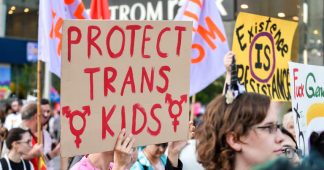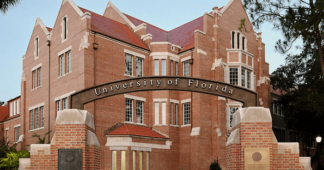By Rikki Schlott
Jan 7, 2023
Florida mom of three January Littlejohn, 45, used to be “a huge proponent” of the public school system. “I was even ‘volunteer of the 2019-2020 school year’ at my daughter’s school,” she told The Post.
But that all changed in September of 2020 when she learned that officials at Deerlake Middle School had surreptitiously met with her then 13-year-old daughter about her gender identity without parental consent.
“I can no longer trust the state to . . . make sure that I am included in critical conversations happening with my child,” declared Littlejohn, a stay-at-hom mom and licensed mental health counselor.
When Littlejohn asked school officials what was going on, they told her they couldn’t reveal anything because her daughter was protected by anti-discrimination law.
Littlejohn said she was left in the dark until she finally secured a meeting six weeks later with a school official who showed her husband a six-page document about her daughter’s “transgender support session.” It spoke about her chosen name, preferred pronouns, what restrooms she would use, and where she wanted to stay on overnight field trips.
In short, her young daughter was socially transitioning at school without her knowledge. Now Littlejohn is suing the school district for violating her parental rights.
Although a judge recently granted the district’s motion to dismiss the lawsuit, the family is planning to appeal. “These types of decisions should not be occurring without parental notification and consent,” Littlejohn said.
Situations like Littlejohn’s would now be prevented by Florida’s Parental Rights in Education Act — dubbed the “Don’t Say Gay Bill” by its opponents — a provision largely ignored by the media when it was first introduced in January 2022. At the time, critics blasted the bill’s limitation of in-class discussion of gender and sexuality, and breezed past the bill’s focus on parental rights.
Section one of the legislation, signed into law by Republican Gov. Ron DeSantis last March, affirms the rights of parents to be involved in any gender identity intervention between the school and their child. It bans schools from hiding information about mental health counseling and supports monitoring from parents, except in extreme cases that would “result in abuse, abandonment, or neglect.”
The lawmakers who penned the Parental Rights in Education Act found policies in at least seven Florida counties that could remove parents from important conversations about their children’s gender identity. The law now makes these policies illegal.
The other part of the bill, which sought to regulate discussion of gender and sexuality in the classroom, sparked nationwide protests, with critics slamming it as an “aggressive attack” on LGBTQ Floridians and claiming it “endangers the safety of all students.”
Protesters wielded signs stating “protect trans kids,” “our existence is not inappropriate” and “we won’t be erased.” Employees of Disney, one of the state’s largest employers, staged a walkout. Florida state Sen. Lauren Book accused the legislation of bringing “George Orwell’s dystopian novel, ‘1984,’ a step closer to reality,” and even President Biden condemned it as “hateful.
Among the critics was Zander Moricz, a current Harvard freshman and recent graduate of the Pine View School in Sarasota County who told ABC News that his principal forbade him from speaking about his LGBTQ activism in his graduation address as class president. Instead, when he gave his speech in May 2022, he used his curly hair as a euphemism for being gay as he criticized the bill.
“There are going to be so many kids with curly hair who need a community like Pine View and they won’t have one,” Moricz said. “Instead, they’ll try to fix themselves so they can exist in Florida’s humid climate.”
But, despite all the backlash, the law took effect as planned on July 1, and eventually the media frenzy died down. Now, six months into the bill’s existence, The Post asked experts, parents and educators: What has been the true impact of Florida’s new law?
Have LGBTQ rights been curtailed, as was feared by so many — or have parental rights been shored up? Or is the reality somewhere in between?
In just seven pages, the Parental Rights in Education Act bans “classroom instruction” on gender identity in kindergarten through third grade. It also prohibits “classroom discussion about sexual orientation or gender identity in certain grade levels.”
Proponents say this regulation is required to protect children after years of controversy over gender ideology seeping into America’s classrooms. They also say panic over the bill was overblown.
“It was fear-mongering,” Moms for Liberty founder and Florida mom Tina Descovich told the Post.
Although Florida public schools never had any official curriculum about gender and sexuality in kindergarten through third grade, the writers of the bill say they found evidence of it seeping into classrooms. They pointed to Palm Beach County School District’s Guidelines for Curriculum, where teachers are urged to “include affirmative topics about LGBTQ+ persons in curriculum and classroom discussions.” Most crucially, “no parental notification is needed for these classroom discussions,” the Guidelines say.
Continue reading at nypost.com
We remind our readers that publication of articles on our site does not mean that we agree with what is written. Our policy is to publish anything which we consider of interest, so as to assist our readers in forming their opinions. Sometimes we even publish articles with which we totally disagree, since we believe it is important for our readers to be informed on as wide a spectrum of views as possible.











